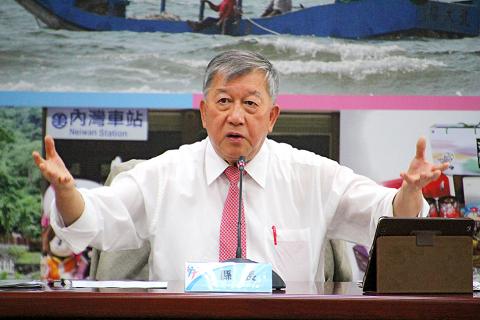A backlog of 8,000 tonnes of unprocessed garbage has sparked a war of words between Hsinchu County Commissioner Chiu Ching-chun (邱鏡淳) of the Chinese Nationalist Party (KMT) and Democratic Progressive Party Hsinchu County commissioner candidate Cheng Chao-fang (鄭朝方).
Chiu has repeatedly suggested that some unnamed people have highlighted the garbage issue for political gain.
He called Cheng’s proposal to create a waste disposal cooperative with Taoyuan and Miaoli County “cliched” and claimed that his administration last year had made an identical proposal, which was turned down by the Hsinchu City Government.

Photo: Huang Mei-chu, Taipei Times
The county government would again submit the proposal to Hsinchu Mayor Lin Chih-chien (林智堅) in the near future, Chiu said.
The county government has signed a contract with a food waste treatment plant in Hsinfeng Township (新豐) to increase the region’s disposal capacity and has opened bidding to recycle waste from landfills into industrial fuel, he said.
Cheng’s campaign office said that Chiu’s negligence over his two terms in office have caused the garbage problem, adding that the public’s trust in and patience for Chiu and Hsinchu County Deputy Commissioner Yang Wen-ke (楊文科) have run out.
Yang is the KMT’s candidate for Hsinchu County commissioner.
Separately, the Hsinchu City Bureau of Environmental Protection said in a statement that the city’s incineration plant processes 150 tonnes of the county’s waste each day, equivalent to 70 percent of the county’s daily trash.
“Instead of politicizing the waste problem, the county should develop long-term plans for waste disposal on its own,” the bureau said.
The county government is responsible for disposing of or utilizing the incinerator residue from its waste, as the issue is outside of the regional cooperation proposal, the bureau said.
According to its calculations, processing the county’s waste has generated 6,659 tonnes of incinerator residue and 2,220 tonnes of fly ash monolith, the bureau said, adding that the city government expects the county to take responsibility for the problem.

Beijing could eventually see a full amphibious invasion of Taiwan as the only "prudent" way to bring about unification, the US Department of Defense said in a newly released annual report to Congress. The Pentagon's "Annual Report to Congress: Military and Security Developments Involving the People's Republic of China 2025," was in many ways similar to last year’s report but reorganized the analysis of the options China has to take over Taiwan. Generally, according to the report, Chinese leaders view the People's Liberation Army's (PLA) capabilities for a Taiwan campaign as improving, but they remain uncertain about its readiness to successfully seize

Taiwan is getting a day off on Christmas for the first time in 25 years. The change comes after opposition parties passed a law earlier this year to add or restore five public holidays, including Constitution Day, which falls on today, Dec. 25. The day marks the 1947 adoption of the constitution of the Republic of China, as the government in Taipei is formally known. Back then the Chinese Nationalist Party (KMT) governed China from Nanjing. When the KMT, now an opposition party in Taiwan, passed the legislation on holidays, it said that they would help “commemorate the history of national development.” That

Trips for more than 100,000 international and domestic air travelers could be disrupted as China launches a military exercise around Taiwan today, Taiwan’s Civil Aviation Administration (CAA) said yesterday. The exercise could affect nearly 900 flights scheduled to enter the Taipei Flight Information Region (FIR) during the exercise window, it added. A notice issued by the Chinese Civil Aviation Administration showed there would be seven temporary zones around the Taiwan Strait which would be used for live-fire exercises, lasting from 8am to 6pm today. All aircraft are prohibited from entering during exercise, it says. Taipei FIR has 14 international air routes and

Snow fell on Yushan (Jade Mountain, 玉山) yesterday morning as a continental cold air mass sent temperatures below freezing on Taiwan’s tallest peak, the Central Weather Administration (CWA) said. Snowflakes were seen on Yushan’s north peak from 6:28am to 6:38am, but they did not fully cover the ground and no accumulation was recorded, the CWA said. As of 7:42am, the lowest temperature recorded across Taiwan was minus-5.5°C at Yushan’s Fengkou observatory and minus-4.7°C at the Yushan observatory, CWA data showed. On Hehuanshan (合歡山) in Nantou County, a low of 1.3°C was recorded at 6:39pm, when ice pellets fell at Songsyue Lodge (松雪樓), a